#crypto asset management company
Explore tagged Tumblr posts
Text
Cryptocurrency Evolution: Mastering Wealth in the Digital Frontier
In the fast-paced world of finance, the emergence of cryptocurrency has revolutionized traditional investment strategies. Crypto coin investment and crypto asset management company have become pivotal players in navigating the digital frontier of wealth creation. As we delve into this transformative landscape, a standout player shines brightly, offering unique opportunities and exemplary asset management solutions.

The Rise of Cryptocurrency Investment: A New Era Unfolds
The advent of cryptocurrencies has given rise to a seismic shift in investment paradigms. Investors are now exploring the realm of digital assets, seeking lucrative returns and diversification. This particular entity, a trailblazer in crypto coin investment, stands at the forefront of this financial evolution. With a keen eye on market trends, the crypto asset management company provides a gateway for investors to harness the potential of blockchain technology.
Navigating Market Dynamics: Crypto Asset Management Expertise
In the volatile world of cryptocurrencies, effective asset management is paramount. The entity excels in crypto asset management, employing sophisticated strategies to optimize returns while minimizing risks. The commitment to staying ahead of market dynamics positions it as a reliable partner for investors navigating the ever-changing crypto landscape. Through meticulous analysis and strategic planning, the entity ensures that client portfolios remain resilient despite market fluctuations.
Innovation and Security: A Unique Approach
Innovation and security are the cornerstones of success in crypto coin investment and crypto asset management company. This entity sets itself apart by adopting cutting-edge technologies and robust security measures. The forward-thinking approach ensures that clients benefit from the latest advancements in blockchain and cryptocurrency, fostering a sense of trust and confidence. The commitment to security creates a safe environment for investors to explore and capitalize on the vast potential of the crypto market.
Client-Centric Solutions: Tailoring Strategies for Success
At this entity, the focus extends beyond market trends to clients' individual needs. The company understands that each investor has unique goals and risk tolerances. Through personalized consultations and tailored strategies, the entity crafts bespoke solutions that align with the financial objectives of its diverse clientele. This client-centric approach sets the company apart in the world of crypto coin investment and fosters long-term relationships built on mutual trust and success.

Conclusion:
The transformative force of cryptocurrency investment and asset management has ushered in a new era of financial opportunities. The standout player in crypto coin investment and asset management emerges as a beacon of innovation and security in this dynamic landscape. With a commitment to navigating market dynamics and providing client-centric solutions, this entity is a reliable partner for those seeking to unlock wealth in the digital age. Explore the future of finance with confidence, and let singularvest.com guide you toward a prosperous crypto journey.
Blog Source URL:
#crypto coin trading app#decentralized hedge fund#app for crypto investment#application for crypto trading#crypto asset management company
0 notes
Text
Top Cryptocurrency Startups in Canada

Discover Innovative Cryptocurrency Startups in Canada Learn about the top cryptocurrency firms in Canada that are thriving in industries like gaming, lending, trading, DeFi, and blockchain infrastructure. These forward-thinking businesses are influencing the direction of technology and digital finance by providing cutting-edge solutions that spur expansion and change the crypto scene in Canada and abroad. Leading Crypto Startups in Canada The blockchain business in Canada is growing, and its future is being shaped by creative startups. These enterprises provide businesses and consumers with innovative services. Launched in 2018, Ledn specializes in neglected markets such as Latin America and offers specialized loan and borrowing products in the crypto finance space. Another 2018 startup, VirgoCX, provides a safe and easy-to-use cryptocurrency trading platform that emphasizes security and openness. Asteroid 1 provides CAD-based trading and teaches Canadians about digital currencies, while Index Coop streamlines decentralized finance through controlled cryptocurrency indices. TrustSwap creates safe DeFi apps for investors of all stripes, including institutional clients. These firms demonstrate their broad reach by driving blockchain innovation and impacting industries like gaming. Innovative Blockchain Solutions for the Gaming Industry Thanks to cutting-edge blockchain solutions, the Canadian gaming industry is undergoing a major transformation. From traditional RPGs to the growing sector of online casinos in Canada, companies like Horizon Blockchain Games Inc. are leading the way by creating user-focused environments where players can control their digital assets and participate in transparent economies. This tactic gives players a true sense of ownership over their virtual in-game possessions in addition to improving their gaming experiences. Another well-known company based in Vancouver, Dapper Labs, is skilled at creating immersive blockchain-powered experiences that combine gameplay with real-world interactions. By utilizing state-of-the-art blockchain technology, Dapper Labs creates novel revenue streams and vibrant gaming communities. By establishing ground-breaking game markets based on real asset control through seamlessly integrated secondary marketplaces for player-to-player exchange of digital property, Mythical Games is also breaking new ground in the industry.
To Know More- top cryptocurrency startups in Canada
#top cryptocurrency startups in Canada#best crypto exchanges in Canada#Canadian blockchain companies#DeFi platforms#innovative crypto lending solutions#gaming blockchain startups#cross-border crypto payment solutions#digital asset management services
0 notes
Text
1 note
·
View note
Text

Wealth and Loyalty Company provides fully managed investment portfolios managed within a bitcoin investment-management framework. Around 150 customers from all around the world, including families, professional trainees, businesses, and high-net-worth individuals, trust us. In the bitcoin market, we always offer safe, profitable earnings.
#Cryptocurrency management#Cryptocurrency portfolio management#Cryptocurrency wealth management#Crypto wealth management#Crypto asset investment company
0 notes
Text
Wealth Building: Money Topics You Should Learn About If You Want To Make More Money
Budgeting: This means keeping track of how much money you have and how you spend it. It helps you save money and plan for your needs.
Investing: This is like putting your money to work so it can grow over time. It's like planting seeds to grow a money tree.
Saving: Saving is when you put some money aside for later. It's like keeping some of your treats for another day.
Debt Management: This is about handling money you owe to others, like loans or credit cards. You want to pay it back without owing too much.
Credit Scores: Think of this like a report card for your money habits. It helps others decide if they can trust you with money.
Taxation: Taxes are like a fee you pay to the government. You need to understand how they work and how to pay them correctly.
Retirement Planning: This is making sure you have enough money to live comfortably when you're older and no longer working.
Estate Planning: This is like making a plan for your stuff and money after you're no longer here.
Insurance: It's like paying for protection. You give some money to an insurance company, and they help you if something bad happens.
Investment Options: These are different ways to make your money grow, like buying parts of companies or putting money in a savings account.
Financial Markets: These are places where people buy and sell things like stocks and bonds. It can affect your investments.
Risk Management: This is about being careful with your money and making smart choices to avoid losing it.
Passive Income: This is money you get without having to work for it, like rent from a property you own.
Entrepreneurship: It's like starting your own business. You create something and try to make money from it.
Behavioral Finance: This is about understanding how your feelings and thoughts can affect how you use money. You want to make good choices even when you feel worried or excited.
Financial Goals: These are like wishes for your money. You need a plan to make them come true.
Financial Tools and Apps: These are like helpers on your phone or computer that can make it easier to manage your money.
Real Estate: This is about buying and owning property, like a house or land, to make money.
Asset Protection: It's about keeping your money safe from problems or people who want to take it.
Philanthropy: This means giving money to help others, like donating to charities or causes you care about.
Compounding Interest: This is like a money snowball. When you save or invest your money, it can grow over time. As it grows, you earn even more money on the money you already earned.
Credit Cards: When you borrow money or use a credit card to buy things, you need to show you can pay it back on time. This helps you build a good reputation with money. The better your reputation, the easier it is to borrow more money when you need it.
Alternate Currencies: These are like different kinds of money that aren't like the coins and bills you're used to like Crypto. It's digital money that's not controlled by a government. Some people use it for online shopping, and others think of it as a way to invest, like buying special tokens for a game.
986 notes
·
View notes
Text
2024 team sponsors recap!
this is completely irrelevant to F1 but i study and do these stuffs for a living sooo 😩😩 2023 sponsors are based on the sponsors that are there at the beginning of the season (new sponsors that join in the middle of the season will be classified as 2024's)
Mercedes AMG Petronas F1 Team:
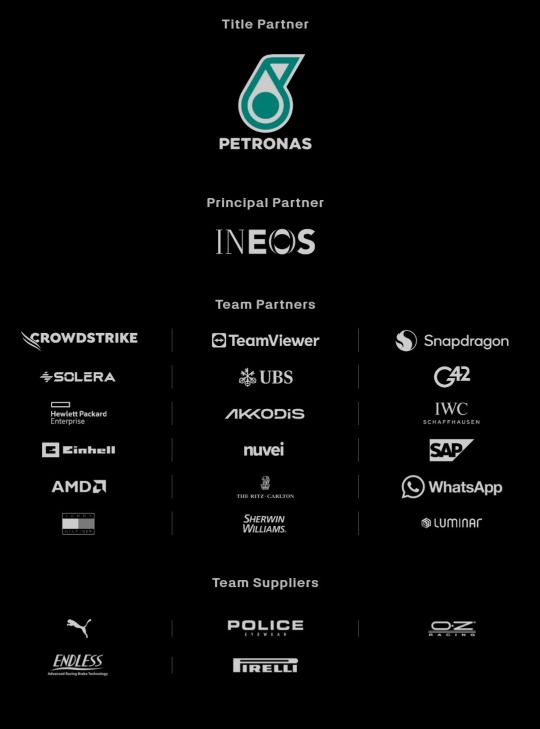
New sponsors: Whatsapp, Luminar (American tech company), SAP (German software company), nuvei (Canadian credit card services), Sherwin Williams (American painting company) 2024 data last update: 2024/02/14
Old sponsors that left: Monster Energy, Pure Storage (American technology company), fastly (American cloud computing services), Axalta (American painting company), Eight sleep (American mattresses company) 2023 data last update: 2023/01/07
Oracle Red Bull Racing F1 Team:
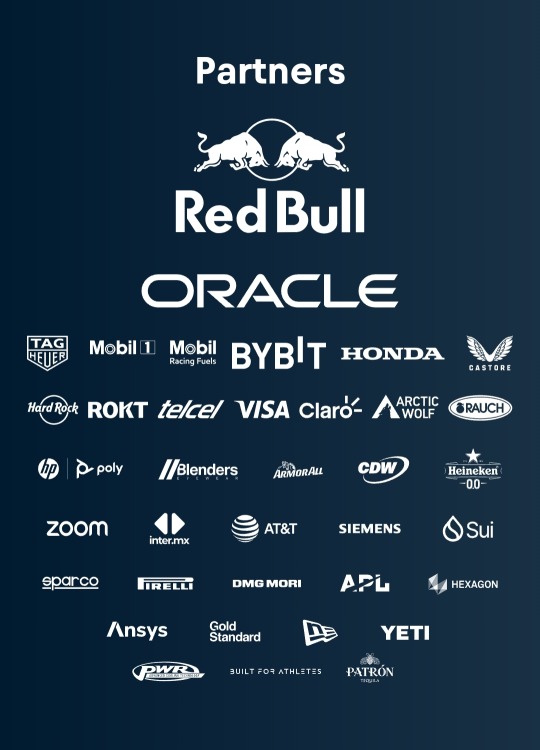
New sponsors: Yeti (American cooler manufacturer, joined later in 2023), APL (American footwear/athletic apparel manufacturer, joined later in 2023), CDW (American IT company, joined later in 2023), Sui (American tech app by Mysten Labs, joined later in 2023), Patron Tequila (Mexican alcoholic beverages company, joined later in 2023) 2024 data last update: 2024/02/15
Old sponsors that left: CashApp, Walmart, Therabody (American wellness technology company), Ocean Bottle (Norwegian reusable bottle manufacturer), PokerStars (Costa Rican gambling site), Alpha Tauri (? no info if they're official partners or not but Austrian clothing company made by Red Bull), BMC (Switzerland bicycle/cycling manufacturer), Esso (American fuel company, subsidiary of ExxonMobil), Hewlett Packard Enterprise (American technology company) 2023 data last update: 2023/03/07
More: Esso is a subsidiary of Mobil so there's possibility they merged or something
Scuderia Ferrari:
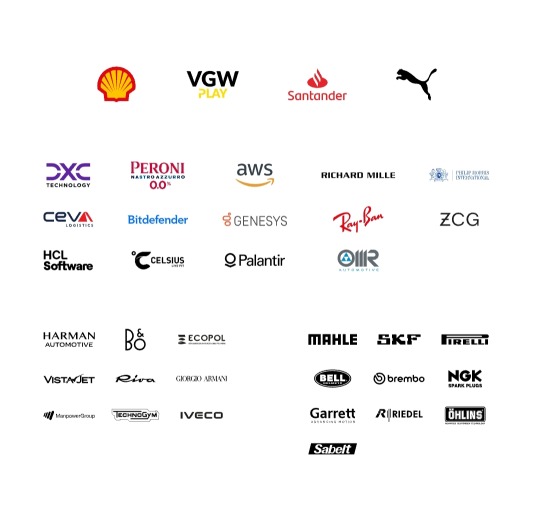
New sponsors: VGW Play (Australian tech game company, joined later in 2023), DXC Technology (American IT company, joined later in 2023), Peroni (Italian brewing company), Z Capital Group/ZCG (American private asset management/merchant bank company), Celsius (Swedish energy drink manufacturer) 2024 data last update: 2024/02/15
Old sponsors that left: Mission Winnow (American content lab by Phillip Morris International aka Marlboro), Estrella Garcia (Spanish alcoholic beverages manufacturer), Frecciarossa (Italian high speed train company) 2023 data last update: 2023/02/16
More: Mission Winnow is a part of Phillip Morris International. They are no longer listed as team sponsor but PMI is listed instead.
(starting here, 2023 data last update is 2023/02/23 and 2024 data last update is 2024/02/15)
McLaren F1 Team: (Only McLaren RACING's data is available idk if some of these are XE/FE team partners but anw..)
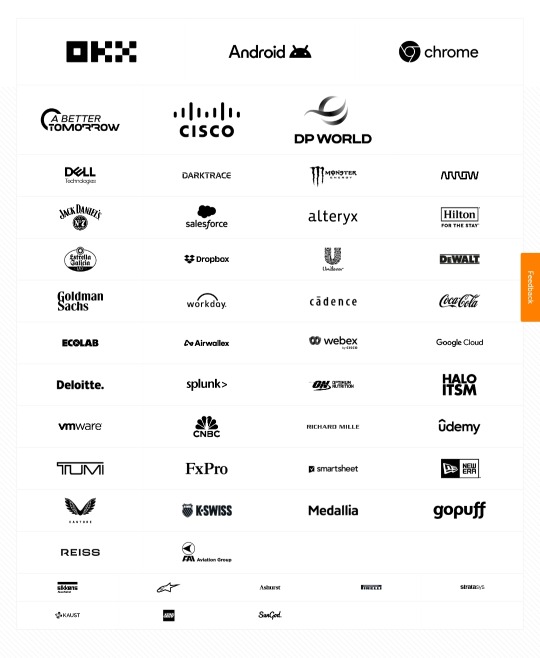
New sponsors: Monster Energy, Salesforce (American cloud based software company, joined later in 2023), Estrella Garcia (Spanish alcoholic beverages manufacturer), Dropbox (American file hosting company), Workday (American system software company, joined later in 2023), Ecolab (American water purification/hygiene company), Airwallex (Australian financial tech company), Optimum Nutrition (American nutritional supplement manufacturer), Halo ITSM (American software company, joined later in 2023), Udemy (American educational tech company, joined later in 2023), New Era (American cap manufacturer, joined in 2023), K-Swiss (American shoes manufacturer, joined later in 2023), Alpinestars (Italian motorsports safety equipment manufacturer)
Old sponsors that left: DP World (Emirati logistics company), EasyPost (American shipping API company), Immersive Labs (UK cybersecurity training company?), Logitech, Mind (UK mental health charity), PartyCasino (UK? online casino site), PartyPoker (American? gambling site), Sparco (Italian auto part & accessory manufacturer), Tezos (Switzerland crypto company)
Aston Martin Aramco F1 Team:
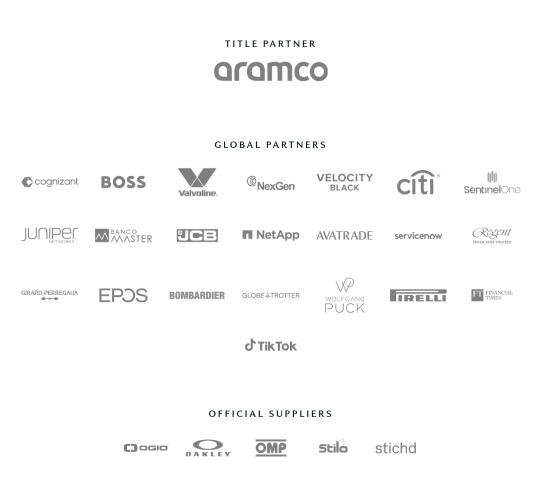
New sponsors: Valvoline (American retail automotives service company, joined later in 2023), NexGen (Canadian sustainable? fuel company), Banco Master (Brazilian digital banking platform, joined later in 2023), ServiceNow (American software company, joined later in 2023), Regent Seven Seas Cruise, Wolfgang Puck (Austrian-American chef and restaurant owner, joined later in 2023), Financial Times (British business newspaper), OMP (Italian racing safety equipment manufacturer), stichd (Netherlands fashion & apparel manufacturer)
Old sponsors that left: Alpinestars (Italian motorsports safety equipment manufacturer), crypto.com (Singaporean cryptocurrency company), ebb3 (UK? software company), Pelmark (UK fashion and apparel manufacturer), Peroni (Italian brewing company), Porto Seguro (Brazilian insurance company), Socios (Malta's blockchain-based platform), XP (Brazilian investment company)
Stake F1 Team (prev. Alfa Romeo):
???? Can't found their website (might be geoblocked in my country???)
BWT Alpine F1 Team:
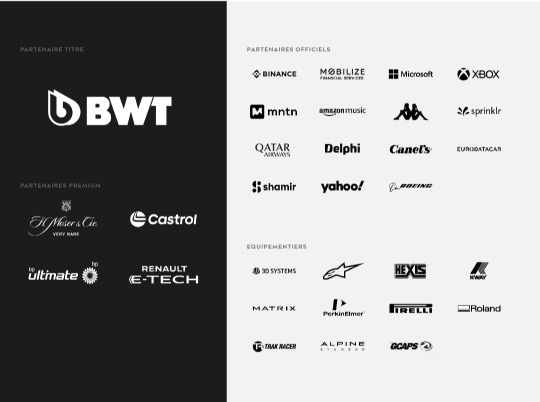
New sponsors: MNTN (American software company), H. Moser & Cie (Switzerland watch manufacturer), Amazon Music
Old sponsors that left: Bell & Ross (French watch company), Ecowatt (??? afaik French less-energy smthn smthn company), Elysium (French? American? Software company), KX (UK software company), Plug (American electrical equipment manufacturing company)
Visa CashApp RB F1 Team (prev. Scuderia Alpha Tauri):
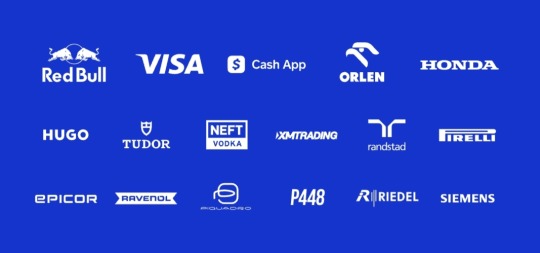
New Sponsors: Visa, CashApp, Hugo Boss, Tudor, Neft Vodka (Austrian alcoholic beverages company), Piquadro (Italian luxury bag manufacturer)
Old sponsors that left: Buzz (?), Carl Friedrik (UK travel goods manufacturer), Flex Box (Hongkong? shipping containers manufacturer), GMG (Emirati global wellbeing company), RapidAPI (American API company)
Haas F1 Team:
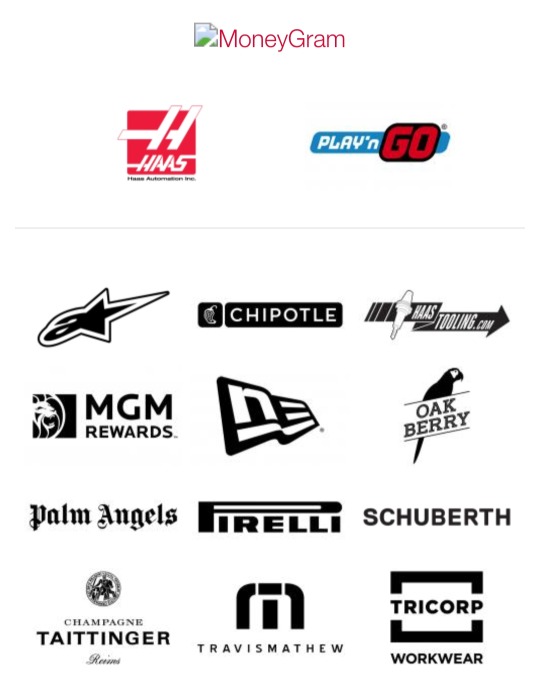
New sponsors: New Era (American cap manufacturer, joined later in 2023)
Old sponsors that left: Hantec Markets (Hongkong capital markets company), OpenSea (American NFT/Crypto company)
Williams Racing:

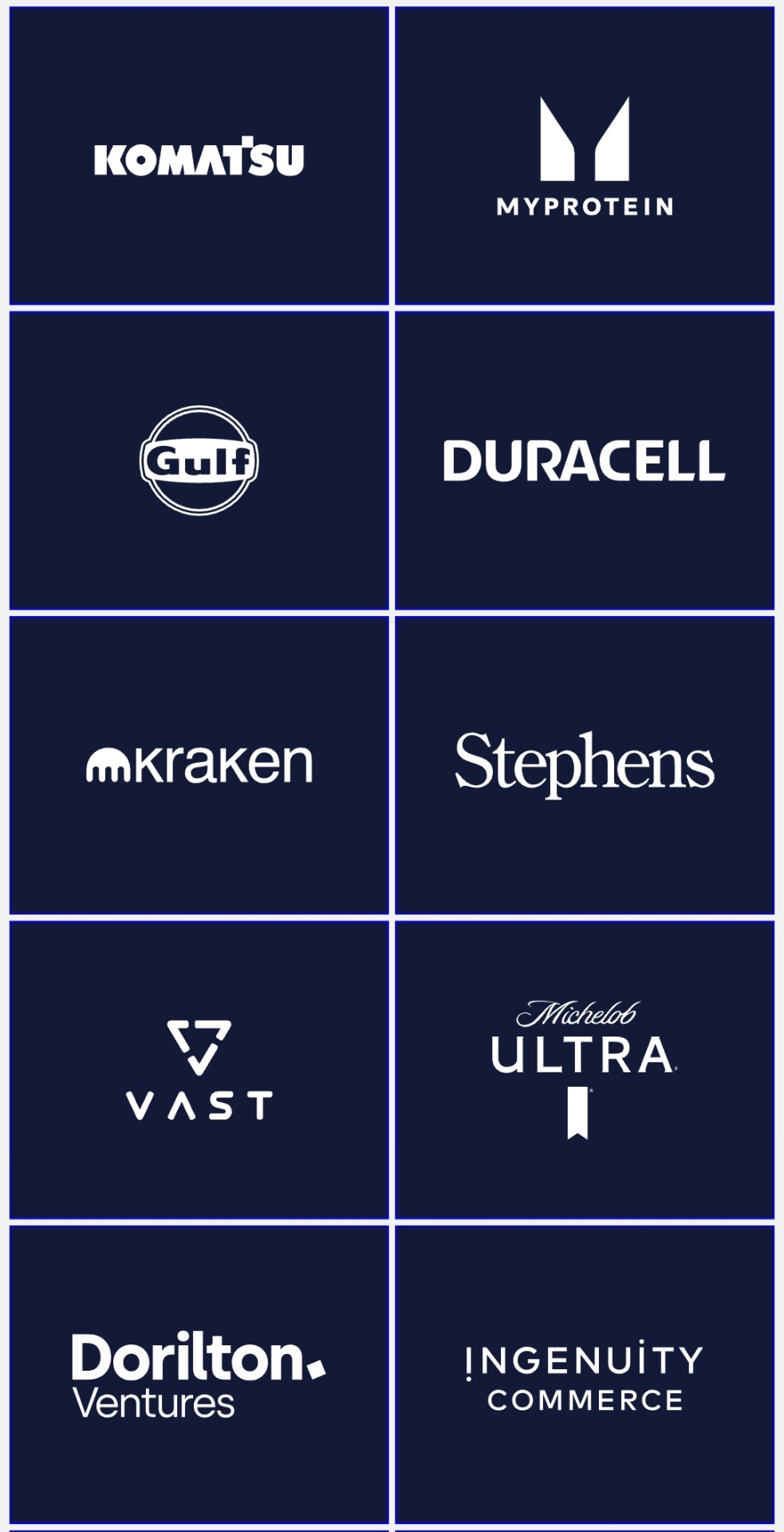
New sponsors: Komatsu, MyProtein (British bodybuilding supplement), Kraken (American crypto company, joined later in 2023), VAST Data (American tech company), Ingenuity Commerce (UK e-commerce platform), Puma (joined later in 2023)
Old sponsors that left: Acronis (Swiss software company), Bremont (British watch manufacturer), Dtex Systems (American? cybersecurity company), Financial Times (British business newspaper), Jumeirah Hotels & Resorts, KX (UK software company), OMP (Italian racing safety equipment manufacturer), PPG (American painting manufacturer), Umbro (English sports equipment manufacturer), Zeiss (German opticals/optometrics manufacturing company)
#mercedes amg petronas#red bull racing#scuderia ferrari#visa cash app rb#haas f1 team#mclaren f1#aston martin#alpine f1#williams racing#stake f1 team#f1#ari's rant#sponsor talks
42 notes
·
View notes
Text
Company Establishment in Turkey

Company establishment in Turkey has become a popular avenue for both foreign and domestic investors, offering numerous benefits such as a young population, favorable currency rates, and decreasing production and labor costs. The dynamic economy, strategic location, and favorable regulatory framework have made Turkey an attractive destination for businesses aiming to expand in the region.
Legal Framework
The foundation of company registration in Turkey is governed by the Turkish Commercial Code (Law No. 6102). This key legislation outlines the legal requirements for forming a company, regardless of whether the business is owned by domestic or foreign entrepreneurs. Complementary laws, such as the Turkish Code of Obligations (No. 6098) and Turkish Civil Code (No. 4721), also play a role in specific aspects of company operations.
Under the law, companies in Turkey acquire legal personality upon registration with the Trade Registry, meaning they are recognized as separate legal entities. This legal separation allows companies to enjoy rights and undertake obligations in their own name, and protects investors from personal liability in many cases.
Foreign Investment in Turkey
Foreigners are allowed to establish companies in Turkey with the same rights as Turkish citizens. The Foreign Direct Investment Law (No. 4875), enacted in 2013, eliminated the legal distinctions between foreign and domestic investors, providing equal treatment to both. This legal framework makes it easier for foreign investors to enter the Turkish market and benefit from its growing opportunities.
Recent legislative developments, such as the 2024 FATF Decision on Türkiye, have further improved Turkey’s attractiveness as an investment hub, particularly with the enactment of new laws like the Turkish Crypto Law (No. 7518). This law addresses critical areas such as digital assets, cryptocurrencies, and peer-to-peer platforms, providing clarity and structure for investors interested in emerging technologies.
Company Types and Registration Process
Investors have the option to establish five types of companies in Turkey, as stipulated in the Turkish Commercial Code:
Collective Companies
Commandite Companies
Cooperatives
Limited Companies
Joint-Stock Companies
The incorporation process can be efficiently completed through MERSİS, the Central Registry System, allowing businesses to finalize registration electronically. One notable advantage in Turkish company law is the ability to establish a single-shareholder joint-stock company or a single-member limited liability company.
To register a company, several steps must be followed:
Draft and sign the company contract,
Prepare signature declarations of company officials,
Pay relevant fees, including the Competition Authority share and capital,
Submit required documents to the Trade Registry Office.
Taxation and Corporate Governance
In Turkey, companies are generally subject to a 20% corporate income tax, while finance-related businesses like banks face a higher rate of 25%. Investors should stay updated on tax changes, including the 2024 amendments to Turkish tax laws, as they can significantly impact business operations.
Once a company is established, the proper management of corporate governance becomes crucial. The Turkish Commercial Code includes specific provisions on how the board of directors should function, ensuring that businesses operate smoothly and in compliance with national laws. Companies must adhere to these corporate governance rules to maintain their legal standing and avoid potential legal issues.
Investment Opportunities and Methods
In addition to direct company establishment, foreign investors may consider other investment options in Turkey, such as:
Share Acquisition: Buying shares of an existing company instead of establishing a new one,
Liaison Offices: Setting up representative offices that handle non-commercial activities,
Franchising: Turkey’s franchising market is open to foreign entrepreneurs, though it is governed by general contract law rather than specific franchising regulations.
Moreover, the Investment Incentive Regime provides significant benefits for businesses in various sectors, including tax reductions, exemptions, and subsidies, making it an appealing option for entrepreneurs considering long-term investments in Turkey.
Additional Steps and Requirements
Beyond the formal registration process, businesses must fulfill several other requirements to begin operations, including:
Opening a bank account,
Obtaining a tax identification number,
Registering for social security if employees are hired,
Acquiring relevant licenses and permits based on the industry.
For example, businesses in the health sector are subject to additional licensing requirements, and recent updates to the 2024 Medical Laboratories Regulation have made significant changes in this field.
Liquidation Process
Companies in Turkey may undergo liquidation through either a voluntary or compulsory process. Liquidation involves selling the company’s assets, collecting receivables, and paying off debts. The liquidation procedure is governed by the Enforcement and Bankruptcy Code (No. 2004) and requires careful management to ensure that the legal entity is properly dissolved.
Conclusion
Turkey’s favorable legal environment, strategic location, and recent regulatory developments offer substantial opportunities for investors. Whether establishing a new company, acquiring shares, or exploring franchising opportunities, Turkey’s business-friendly framework provides a solid foundation for growth. By navigating the legal and bureaucratic processes with the help of experienced legal professionals, foreign and domestic entrepreneurs can successfully establish and expand their businesses in Turkey.
For more information about this topic, please click to https://www.pilc.law/establishment-of-a-company-in-turkey/
3 notes
·
View notes
Text
Multi-Factor, Layered, Cryptographic System
A few big flaws with crypto are; how large and unwieldy the ledger can get, the centralization of decentralized systems, congestion at the base cryptographic layer, potential loss of a wallet, automation errors, a complete lack of oversight.
Cryptographic Systems are designed to be decentralized, trustless, transactional, and secure.
The problem with this; is as the Crypto environment grew; the need to bypass some of those features became a requirement.
Decentralization gave way to crypto stores and Wallet Vaults, as well as the potential for complete loss of value (despite it being an online thing), and introducing waste to the ledger through these lost "Resources".
Trustless gave way to legal restrictions and disputes, and the formerly decentralized environment was tethered to the world economy.
Transactional gave way to inflation when It became a valued asset that was used for more than secure transactions.
And... Block chain technology has proven to be very insecure and exploitable. With several Bitcoin "Branches" being made after large thefts or errors had occured.
The Automation and Scripting layer of crypto also has potential for "Unchecked Run times" and wasted Network Cycles and Waste of Electric Power.
Needless to say; Crypto no longer serves its original purpose.
Despite all this; Crypto still has great potential. And our Future Internet designs should include protocols specifically to support it.
Separately from other internet traffic, but still, alongside it.
So what can we do with the tech to make it more usable..?
Well, first things first; Crypto has large waste of Power and Internet Bandwidth that needs to be addressed. And I would *suggest* a temporary ban of "Unaccountable Automated Wide-Area Systems".
Automated Wide-Area Systems can be installed on multiple computers over the internet, and because they are "trustless" are often overlooked when they waste resources.
Because of the need for Accountability of these systems on our networks; there are still opportunities for the companies which manage them. However, I disagree with the current idea of oligarchic accountability termed "Proof of Stake". (It will be clear what my suggestion for this will be by the end of the article.)
Because there's a need for these systems to be transactional; we should be wary of how "Automated Transactions" are designed. As large amounts of assets can accidentally trade hands over the span of nanoseconds.
And we still want them to be Decentralized and Secure.
The Ethereum model creates extra cryptographic layers to cover some of the weaknesses in BitCoin, and this actually allows for an illuminated solution to our "Dark Pools" in the finance sector.
And the need to reduce waste on our Electric and Network Infrastructure (especially in the case of climate change) necessitates that we know where every digital asset on such a system is accounted for.
It also means we need a method of "Historical Ledger" disposal; so that we both have long-term records AND reduce the resources required to run a cryptographic system.
Which means we'll need "Data Banks" and "Wallet Custodians". So that nothing is ever lost; while retaining the anonymity the internet provides.
Legal Restrictions here on keeping the privacy of Wallet Owners is very important. We can also *itemize* large wallets, to provide further security and privacy.
These systems can *also* be used to track firearm purchases anonymously. Which will give the tools our ATF needs to track sales, as well as provide the privacy and security that are constantly lobbied by Firearm owners.
I think that covers the *generalized* and *broad* requirements of wide-scale implementation. I figure that Crypto-Enthusiasts may have some input on the matter.
2 notes
·
View notes
Text
The Future of the Internet: How STON.fi and Web3 Are Changing the Game
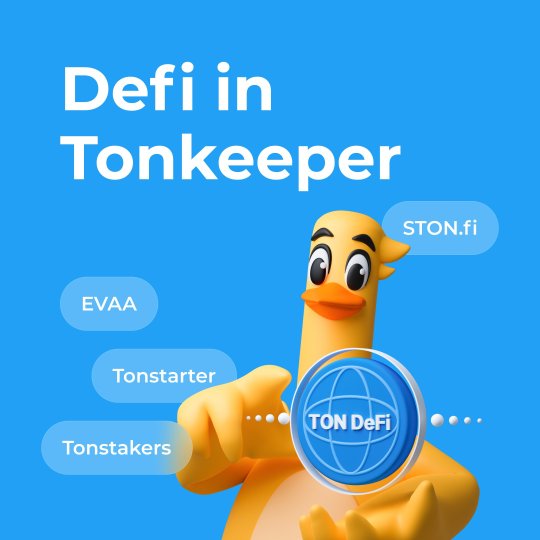
When I first heard about Web3, I’ll admit, I was a little confused. The words sounded futuristic, like something only tech experts could understand. But the truth is, Web3 is already here, and it's shaping the way we interact online—whether we realize it or not. Let me break it down in a way that makes sense and explain how STON.fi is making it all happen.
What is Web3, and Why Should You Care
Web3 is like the next chapter of the internet. It’s different from the internet we use now (Web2), where we rely on companies like Facebook, Google, and banks to manage our online lives. Imagine you’re at a store, and you need a middleman to help you make a simple purchase. That’s how things work in Web2. In Web3, you cut out the middleman—everything happens directly between you and others, without anyone else getting in the way.
So, why should you care? Because Web3 puts you in control. You own your data, your digital assets, and you’re not depending on anyone else to handle your business. This is empowering for anyone who’s tired of big companies controlling what they can and can’t do online.
The Blockchain: The Technology Behind Web3
Okay, now let’s talk about blockchain—the technology that makes Web3 work. You can think of blockchain as a big, public ledger. Imagine a giant notebook where everyone in the network can write down transactions. Once something’s written, it can’t be erased or changed. This is great because it keeps things transparent and trustworthy.
In Web2, companies like banks or social media platforms are in charge of keeping track of everything. But with blockchain, that control is distributed. Everyone can check the transactions, and no one can change the history. It’s like the difference between having a personal notebook that only you can read, versus a public notebook that everyone can see and verify.
TON Blockchain: Why It’s Perfect for Web3
Now that you know what Web3 and blockchain are, let’s talk about TON (The Open Network)—the blockchain that powers STON.fi. Think of TON as a fast, smooth highway that lets you travel from one place to another without roadblocks. While older blockchains can get bogged down with traffic, TON handles things quickly and efficiently, making it perfect for fast and secure transactions.
The best part? TON is scalable. This means as more people join, the network stays strong and doesn’t slow down. So, whether you’re making a small transfer or a large one, TON ensures everything runs smoothly.
STON.fi: A Decentralized Exchange That Puts You First
Now, here’s where things get really interesting. STON.fi is a decentralized exchange (DEX) that runs on the TON blockchain. If you've ever used an exchange to trade crypto, you know there's usually a middleman—a company that facilitates the trade for you. But with STON.fi, you’re not relying on anyone else to make the trade. You’re directly interacting with other users, which keeps things fast and affordable.
Using STON.fi is like buying directly from a farmer at a market instead of going through a grocery store. You don’t need a middleman, and because of that, fees are much lower. You keep more of your money, and the whole process is more transparent.
Why Web3 and STON.fi Matter for You
So why should you care about STON.fi and Web3? The answer is simple: control. Web3 is all about giving you more ownership over your online life. When you use STON.fi, you don’t have to worry about someone else holding your money or making decisions for you. Everything is decentralized, meaning you have full control.
Here are some ways STON.fi gives you more power:
You’re in control of your assets: No more relying on third parties to store or protect your money. You manage it all.
Lower fees: Without middlemen, trading on STON.fi costs less.
More opportunities: By providing liquidity, you can earn passive income while helping the platform grow.
It’s a system that values your autonomy, and with STON.fi, it’s easy to be a part of it.
How You Can Start Using STON.fi
Getting started with STON.fi is simple. Whether you’re new to crypto or you’ve been trading for a while, the platform is designed to be user-friendly. It’s built on the TON blockchain, so you can expect fast transactions and low fees.
If you’re already familiar with other decentralized platforms, you’ll feel right at home using STON.fi. But even if you’re just getting started, you don’t need to be an expert. The platform makes it easy to jump in, and there’s a community ready to support you along the way.
Web3 is Here, and It’s Changing the Way We Live Online
Web3 is not some far-off, futuristic idea—it’s happening right now. And platforms like STON.fi are leading the way. They’re helping to create a world where we can all be in charge of our own online lives. With decentralization, transparency, and security, Web3 is set to change everything, from how we manage our money to how we interact with others online.
So, what’s the takeaway? If you haven’t already, it’s time to start paying attention to Web3 and STON.fi. These technologies aren’t just for the tech-savvy; they’re for everyone who wants more control and better options in their digital life. The future is decentralized, and it’s happening today.
By embracing Web3 and STON.fi, you’re stepping into a future where you are in control of your digital world—no middlemen, no hidden fees, just transparency and freedom.
3 notes
·
View notes
Text

From La Stampa (translated from Italian):
“Make Finance Great Again,” Trump family makes its own cryptocurrency and allies with Silicon Valley It will be called “World Liberty Financial,” will have tech investors and real estate developers from Chase Herro and Zak Folkman to Steve Witkoff inside. Sons Eric and Donald Jr. will coordinate. And his backer Tyler Winklevoss jokes, “Donald has been orange-pilled, indoctrinated.” Jacopo Iacoboni Sept. 17, 2024 Updated 11:00 a.m. 3 minutes of reading
They want to do a kind of “make finance great again,” along the lines of MAGA, the election slogan and the Make America Great Again campaign. Donald Trump's sons, Don Jr. and Eric, of course with their father's imprimatur, are about to launch a new cryptocurrency platform that will be called “World Liberty Financial,” and will allow users to make even massive transactions without a bank getting in the way and extracting fees (and with a very low level of tax tracking, it should be added). A couple of concepts familiar to bitcoin fans, for example, but which the Trump family now has ambitions to decline on a large scale. It is not certain that this marriage between Trumpism and decentralized finance, DeFi, is a harbinger of only positive developments. The board of “World Liberty Financial” will also consist of former crypto investors such as Chase Herro and Zak Folkman, and Steve Witkoff, a real estate developer and old friend of Trump. But thanks to documents filed with the U.S. Federal Election Commission that we have been able to read we know that in general the entire Trump campaign - Make America Great Again Inc. - received money not only from Musk, but cryptocurrency from billionaire twins Cameron and Tyler Winklevoss, who lead the cryptocurrency company Gemini: about $3.5 million in Bitcoin on July 19, the day after Trump's speech at the Milwaukee convention. The Winkelvosses also poured in money to America PAC, the tech investor-backed group that Musk helped launch in 2024 (Trump had bragged that Musk was giving him $45 million a month; Musk said his contribution is “at a much lower level”). Another co-founder of a cryptocurrency exchange, Jesse Powell, boss of Kraken, and venture capitalists Marc Andreessen and Ben Horowitz (who created a16z) who have invested billions of dollars in cryptocurrency startups, have also made endorsements and poured money into Trump. In short, for the Trump family to embark on this big cryptocurrency project is a natural consequence of the fact that these are almost becoming a Republican asset in the campaign, and the “libertarian” wing of the old Gop is now a kind of very, very rampant ideologized “cyberlibertarianism.” The real boss of the “tech bros” according to many is not Elon Musk, but Peter Thiel. Zuckerberg's longtime partner in Facebook, co-founder of PayPal, Thiel's fortune has at least doubled during the Trump presidency. Palantir-a much-discussed software company variously accused of extracting data from Americans and profiling them-has managed to get a contract from the Pentagon. Other donors to MAGA Inc include Jacob Halberg, Palantir's princely analyst, and Trish Duggan, a wealthy Scientology funder and friend of the tech bros. Trump's vice presidential candidate, J. D. Vance, traveled to Silicon Valley and the Bay Area, celebrating a dinner at the home of BitGo CEO Mike Belshe, 100 people each pouring in between $3,300 a plate and a $25,000 roundtable. Trump in 2021 called bitcoin a “fraud against the dollar.” A few weeks ago, speaking in Nashvill at the bitcoin fan conference, he promised, “The United States will become the crypto capital of the planet.” Better than his friend Putin's Russia, although this Trump did not say so explicitly. The fact is that after his speech, Tyler Winklevoss ran on X (now the realm of cyberlibertarians) and joked that Donald had been “orange-pilled,” making a Matrix analogy, had been “indoctrinated,” or had finally seen the real reality behind the appearances.
3 notes
·
View notes
Text
Future Digital Assets: An Exploration of the Crypto Trends

The cryptocurrency world is constantly changing with significant improvements, regulatory changes and market movements prompting companies to either adopt or expand their existing business models. So, what are the trends that will define digital assets in the future?
Now: Rising adoption of digital currencies by the mainstream financial institutions as well as businesses marks the crypto market in 2024. While original cryptocurrencies like Bitcoin and Ethereum are still leading, new entrants come in with novel features.
AI & Cryptocurrency Trading: AI Advances in cryptocurrency trading with machine learning algorithms that can analyze the data, predict market movements, and execute trades accurately. This makes trade execution more efficient and reduces human error.

On Blockchain innovations — recent changes in the Engineering discipline of blockchains such as, sharding or layer-2 solutions that improve scalability, security, and interoperability are helping make blockchain more reliable and flexible.
Investment Strategies in Digital Assets: You need to become familiar with various investment strategies available in Crypto market which includes the trends of the market, risk management and a proper diversification. Keeping an eye on those Bitcoin price predictions and Ethereum 2.0 updates are key to making decisions.
Regulation: “Governments and regulators around the world pay more attention to cryptocurrencies”. With the regulatory environment changing quickly, it is important to appreciate both compliance and growth possibilities.

Decentralized Finance (DeFi) — By providing decentralized versions of every financial service, DeFi is replace them with trust-minimized and highly-resistant smart contracts to provide similar services. These amenities facilitate the direct lending, borrowing and trading of digital assets without intermediaries—thereby providing users with an increased degree of financial autonomy.
Market Trend and Forecast: A thorough market trend enables to grasp market dynamics, whilst making sure about the reported forecasts, get declared predictions. One of the few remaining concepts is the volatility of crypto markets affected by sentiment, regulatory news and technological advancements.
On the level of adoption, we are experiencing a gradual increase in use cases as more organizations now receive payments with this digital asset as well as their customers conducting transactions which are growing.

Blockchain and AI: Combining features of blockchain with the capabilities of AI -this collaboration maximizes data security, improves efficiency and facilitates smarter decision-making, which mean that it can support new generation paradigms in many different markets.
#economy#investing#investment#entrepreneur#personal finance#startup#bitcoin#blockchain#crypto#ethereum
4 notes
·
View notes
Text
Unlocking Opportunities: Thematic Crypto Investment and Trading Brilliance
In a dynamic world of finance, the rise of cryptocurrencies has paved the way for innovative investment strategies. Among these, crypto investment has emerged as a compelling avenue for investors seeking to align their portfolios with specific trends and sectors within the crypto space. This approach transcends the traditional buy-and-hold strategy, offering a nuanced and dynamic way to navigate the crypto market.

Crypto Investment: Navigating the Seas of Opportunity
It involves strategically allocating funds to cryptocurrencies aligned with specific themes or trends. Whether decentralized finance, non-fungible tokens, or sustainable blockchain solutions, investors can tailor their portfolios to capitalize on the growth potential of specific sectors within the crypto ecosystem. As the crypto landscape expands, so do the thematic investment options. Investors can now explore themes ranging from blockchain scalability solutions to the integration of cryptocurrencies in various industries.
Application for Crypto Trading: A Technological Symphony
Practical application for crypto trading is pivotal in realizing the full potential of thematic investments. Technological advancements have given rise to sophisticated trading platforms and tools that empower investors to execute seamless trades, manage risk, and stay informed about real-time market trends. These applications bridge the gap between thematic investment strategies and actionable trading decisions. Integrating artificial intelligence and machine learning in crypto trading applications enhances decision-making processes, providing investors with insights beyond traditional market analysis. These advanced tools empower investors to make informed choices in the fast-paced and volatile crypto market.

Thematic Crypto Investment in Action: A Case for Future Growth
Examining real-world examples illustrates the potential of thematic crypto investment. Consider the rise of decentralized finance as a theme. Investors who strategically allocated funds to decentralized finance projects in their portfolios during the sector's early stages have witnessed remarkable returns. When executed thoughtfully, thematic crypto investment can position investors at the forefront of burgeoning trends, unlocking opportunities for substantial growth.
Conclusion:
As we navigate the dynamic world of thematic crypto investment and trading, singularvest.com emerges as the guiding light. Empowering investors with innovative tools and strategic insights, it is the trusted partner for those seeking to unlock the full potential of their crypto portfolios.
Blog Source URL:
#crypto asset management company#crypto coin trading app#app for crypto investment#decentralized investment management#application for crypto trading#crypto fund investment#decentralized hedge fund
0 notes
Text
Why Solana Could 7x in the Next Few Months: A Deep Dive
Introduction
Solana has been making waves in the cryptocurrency world with its innovative technology and rapidly growing ecosystem. Known for its high-speed transactions, low fees, and robust scalability, Solana is positioning itself as a leading blockchain platform. With increasing adoption and numerous projects building on its network, Solana has the potential to see significant price appreciation in the coming months. In this blog, we will explore why Solana could 7x in value, looking at the factors driving its growth and why it’s a promising investment.
Solana’s Key Advantages

High-Speed Transactions
Solana is renowned for its ability to process transactions at lightning speed. While many blockchains struggle with slow transaction times, Solana can handle over 65,000 transactions per second (TPS). This high throughput is made possible by its unique Proof of History (PoH) consensus mechanism, which timestamps transactions and enables the network to process them in a highly efficient and parallel manner.
Low Transaction Fees
Transaction fees on Solana are significantly lower than those on other major blockchains like Ethereum. With fees often less than a fraction of a cent, Solana makes it economically feasible for users to transact and participate in decentralized applications (dApps) without worrying about high costs. This affordability is particularly attractive for developers and users, driving more projects to build on Solana.
Scalability
Scalability is a critical factor for the success of any blockchain platform. Solana’s architecture is designed to scale seamlessly, ensuring that the network can handle increasing demand without compromising performance. This scalability is essential for supporting the growing number of dApps, decentralized finance (DeFi) projects, and non-fungible tokens (NFTs) on the platform.
Growing Ecosystem
DeFi Projects
The decentralized finance sector has seen explosive growth, and Solana is becoming a major player in this space. Projects like Serum, Raydium, and Mango Markets leverage Solana’s high-speed and low-cost infrastructure to provide efficient and user-friendly DeFi services. As more DeFi projects choose Solana, the platform’s ecosystem expands, attracting more users and increasing the demand for SOL tokens.
NFTs and Gaming
Solana is also making significant strides in the NFT and gaming sectors. With platforms like Solanart and Metaplex, artists and creators can mint and sell NFTs with minimal fees, attracting a growing community of digital artists and collectors. Additionally, gaming projects are harnessing Solana’s capabilities to create immersive and interactive experiences, further driving adoption and usage of the network.
Strategic Partnerships
Solana has established strategic partnerships with major players in the crypto and tech industries. Collaborations with companies like FTX, Chainlink, and Audius provide additional resources and credibility, enhancing Solana’s position in the market. These partnerships also open up new avenues for growth and innovation, contributing to the overall development of the ecosystem.
Institutional Interest
Venture Capital Investments
Solana has attracted significant interest from institutional investors and venture capital firms. Major investment rounds have injected substantial capital into the development and expansion of the Solana ecosystem. This financial backing not only supports ongoing projects but also instills confidence in the platform’s long-term potential.
Adoption by Financial Institutions
Financial institutions are increasingly exploring blockchain technology, and Solana’s high performance makes it an attractive option. As more institutions adopt Solana for various applications, from cross-border payments to digital asset management, the demand for SOL tokens is likely to increase, driving up its value.
Technological Innovations
Proof of History (PoH)
Solana’s Proof of History (PoH) consensus mechanism is a groundbreaking innovation that sets it apart from other blockchains. By creating a verifiable order of events, PoH significantly improves the efficiency and speed of the network. This technology not only enhances transaction throughput but also reduces energy consumption, making Solana more sustainable.
Sealevel
Sealevel is Solana’s parallel smart contract runtime that allows multiple smart contracts to run concurrently. This capability boosts the performance of decentralized applications, enabling them to operate at scale without facing bottlenecks. Sealevel’s efficiency is a key factor in attracting developers to build on Solana, further expanding its ecosystem.
Market Sentiment and Momentum
Positive Community Engagement
The Solana community is highly active and engaged, driving positive sentiment and momentum for the platform. Social media channels, forums, and community events foster a strong sense of belonging and support among Solana enthusiasts. This vibrant community plays a crucial role in promoting Solana and driving adoption.
Bullish Market Trends
The overall cryptocurrency market has been experiencing bullish trends, with many investors seeking high-potential projects to invest in. Solana’s impressive technological capabilities, growing ecosystem, and strong market presence position it well to benefit from these trends. As more investors recognize Solana’s potential, increased buying pressure could lead to significant price appreciation.
How to Invest in Solana
Buying SOL Tokens
To invest in Solana, you can purchase SOL tokens on major cryptocurrency exchanges like Binance, Coinbase, and FTX. Simply create an account, deposit funds, and buy SOL. It’s advisable to transfer your tokens to a secure wallet for safekeeping.
Staking SOL
Staking SOL tokens is another way to invest in Solana and earn rewards. By staking your tokens, you help secure the network and validate transactions. In return, you receive staking rewards, which can be an attractive way to earn passive income while supporting the platform.
Participating in DeFi and NFTs
Engaging with DeFi projects and NFTs on Solana is a practical way to benefit from the platform’s growth. By providing liquidity, trading, or participating in NFT marketplaces, you can gain exposure to Solana’s ecosystem and potentially earn significant returns.
Conclusion
Solana’s unique combination of high-speed transactions, low fees, scalability, and innovative technology positions it as a leading blockchain platform with immense growth potential. The expanding ecosystem, strategic partnerships, institutional interest, and positive market sentiment all contribute to a promising outlook for Solana.
As Solana continues to attract developers, users, and investors, the platform is well-poised for significant price appreciation. With the potential to 7x in value in the coming months, Solana represents a compelling investment opportunity for those looking to participate in the future of decentralized finance and blockchain technology.
Investing in Solana now could position you to benefit from the platform’s ongoing growth and innovation. Whether you’re buying SOL tokens, staking, or participating in DeFi and NFT projects, there are multiple ways to engage with and profit from Solana’s thriving ecosystem. Don’t miss out on this opportunity to be part of the next big thing in crypto.
2 notes
·
View notes
Text
How To Develop A Fintech App In 2024?
FinTech, short for financial technology, represents innovative solutions and products that enhance and streamline financial services. These innovations span online payments, money management, financial planning applications, and insurance services. By leveraging modern technologies, FinTech aims to compete with and often complement traditional financial institutions, improving economic data processing and bolstering customer security through advanced fraud protection mechanisms.
Booming FinTech Market: Key Highlights And Projections
Investment Growth In FinTech
In 2021, FinTech investments surged to $91.5 billion.
This represents nearly double the investment amount compared to 2020.
The significant increase highlights the rapid expansion and investor interest in the global FinTech market.
Projected Growth In Financial Assets Managed By FinTech Companies
By 2028, financial assets managed by FinTech firms are expected to reach $400 billion.
This projection indicates a 15% increase from current levels, showcasing the potential for substantial growth in the sector.
Usage Of Online Banking
About 62.5% of Americans used online banking services in 2022.
This figure is expected to rise as more consumers adopt digital financial services.
Key FinTech Trends In 2024
1. Banking Mobility
The transition from traditional in-person banking to mobile and digital platforms has been significantly accelerated, especially during the COVID-19 pandemic. The necessity for remote banking options has driven a surge in the adoption of smartphone banking apps. Digital banking services have become indispensable, enabling customers to manage their finances without needing to visit physical bank branches.
According to a report by Statista, the number of digital banking users in the United States alone is expected to reach 217 million by 2025. Many conventional banks are increasingly integrating FinTech solutions to bolster their online service offerings, enhancing user experience and accessibility.
2. Use Of Artificial Intelligence (AI)
AI in Fintech Market size is predicted at USD 44.08 billion in 2024 and will rise at 2.91% to USD 50.87 billion by 2029. AI is at the forefront of the FinTech revolution, providing substantial advancements in financial data analytics, customer service, and personalized financial products. AI-driven applications enable automated data analysis, the creation of personalized dashboards, and the deployment of AI-powered chatbots for customer support. These innovations allow FinTech companies to offer more tailored and efficient services to their users.
3. Development Of Crypto And Blockchain
The exploration and integration of cryptocurrency and blockchain technologies remain pivotal in the FinTech sector. Blockchain, in particular, is heralded for its potential to revolutionize the industry by enhancing security, transparency, and efficiency in financial transactions.
The global blockchain market size was valued at $7.4 billion in 2022 and is expected to reach $94 billion by 2027, according to MarketsandMarkets. These technologies are being utilized for improved regulatory compliance, transaction management, and the development of decentralized financial systems.
4. Democratization Of Financial Services
FinTech is playing a crucial role in making financial services more transparent and accessible to a broader audience. This trend is opening up new opportunities for businesses, retail investors, and everyday users. The rise of various digital marketplaces, money management tools, and innovative financing models such as digital assets is a testament to this democratization.
5. Products For The Self-Employed
The increasing prevalence of remote work has led to a heightened demand for FinTech solutions tailored specifically for self-employed individuals and freelancers. These applications offer a range of features, including tax monitoring, invoicing, financial accounting, risk management, and tools to ensure financial stability.
According to Intuit, self-employed individuals are expected to make up 43% of the U.S. workforce by 2028, underscoring the growing need for specialized financial products for this demographic. FinTech companies are responding by developing apps and platforms that address the unique financial needs of the self-employed, facilitating smoother and more efficient financial management.
Monetization of FinTech Apps
1. Subscription Model
FinTech apps can utilize a subscription model, which offers users a free trial period followed by a recurring fee for continued access. This model generates revenue based on the number of active subscribers, with options for monthly or annual payments. It ensures a steady income stream as long as users find the service valuable enough to continue their subscription.
2. Financial Transaction Fees
Charging fees for financial transactions, such as virtual card usage, bank transfers, currency conversions, and payments for third-party services, can be highly lucrative. This model capitalizes on the volume of transactions processed through the app, making it a significant revenue generator.
3. Advertising
In-app advertising can provide a consistent revenue stream. Although it may receive criticism, strategically placed banners or video ads can generate substantial income without significantly disrupting the user experience.
Types Of FinTech Apps
1. Digital Banking Apps
Digital banking apps enable users to manage their bank accounts and financial services without visiting a physical branch. These apps offer comprehensive services such as account management, fund transfers, mobile payments, and loan applications, ensuring transparency and 24/7 access.
2. Payment Processing Apps
Payment processing apps act as intermediaries, facilitating transactions between payment service providers and customers. These apps enhance e-commerce by enabling debit and credit card transactions and other online payment methods, supporting small businesses in particular.
To Read More Visit - https://appicsoftwares.com/blog/develop-a-fintech-app/
#app development#finance app development#finance app#real estate app development#mobile app development#fintech apps
2 notes
·
View notes
Text

Find the power of cryptocurrency wealth management with Wealth And Loyalty, the world's first firm specializing in fully managed investment portfolios and profitable results. Experience the expertise of our cryptocurrency team with over 15 years of investing experience in the crypto markets, backed by a strong investment yield and a stellar reputation that continues to grow year after year.
#Cryptocurrency management#Cryptocurrency portfolio management#Cryptocurrency wealth management#Crypto wealth management#Crypto asset investment company
0 notes
Text
The Pioneering Path: MicroStrategy's Bold Bitcoin Adoption Plan

Bitcoin adoption is rapidly gaining momentum, with various institutions and companies integrating the digital currency into their financial strategies. Among these pioneers, MicroStrategy stands out with its bold and strategic approach to Bitcoin investment. This post explores MicroStrategy's Bitcoin plan, its financial implications, the broader impact on Bitcoin adoption, and how other companies are following suit.
The Rise of Bitcoin Adoption
Bitcoin, once a niche interest for tech enthusiasts, has now become a mainstream financial asset. Companies and institutions are increasingly viewing Bitcoin as a hedge against inflation and a store of value. The decentralized nature of Bitcoin and its potential for high returns have fueled its adoption across various sectors.
MicroStrategy's Bitcoin Strategy
MicroStrategy, led by CEO Michael Saylor, has been at the forefront of corporate Bitcoin adoption. In August 2020, MicroStrategy made headlines by announcing its first Bitcoin purchase, acquiring 21,454 BTC for $250 million. As of June 20, 2024, MicroStrategy holds a staggering 226,331 bitcoins. This aggressive accumulation demonstrates the company's deep conviction in Bitcoin's long-term value.
Michael Saylor has been a vocal advocate for Bitcoin, emphasizing its role as a superior store of value compared to traditional fiat currencies. MicroStrategy's Bitcoin strategy is driven by the belief that Bitcoin is a better long-term investment than holding cash.
Financial and Strategic Impact
MicroStrategy's Bitcoin holdings have significantly impacted its financial statements. The company's Bitcoin assets have appreciated, enhancing its balance sheet and boosting investor confidence. This strategic move has also positioned MicroStrategy as a thought leader in the crypto space, attracting attention from both traditional and crypto investors.
Effect on Stock Price MicroStrategy's stock has experienced significant fluctuations over the past few years. Here is a summary of its performance:
2024: The average stock price so far is $1,169.45, with a year-to-date increase of 134.91%. The stock opened the year at $685.15 and reached a high of $1,919.16, closing at $1,483.76.
2023: The average stock price was $350.03, with a substantial annual increase of 346.15%. The stock opened the year at $145.02 and closed at $631.62, with a high of $670.71.
2022: The average stock price was $293.60, but the year saw a significant decline of 74.00%. The stock opened at $558.26 and closed at $141.57, with a high of $558.26.
2021: The average stock price was $656.31, with an annual increase of 40.13%. The stock opened at $425.22 and closed at $544.49, with a high of $1,272.94.
Overall, MicroStrategy's stock has seen a dramatic rise, particularly in 2023 and 2024, driven largely by its aggressive Bitcoin acquisition strategy and the corresponding increase in Bitcoin's value. Despite the fluctuations, the overall trend reflects the market’s growing confidence in MicroStrategy’s innovative approach to asset management.
The Ripple Effect: Other Companies Following Suit
MicroStrategy's bold move has set a precedent for other companies and institutions. Several high-profile companies have since followed MicroStrategy’s lead, adding Bitcoin to their balance sheets:
Square (now Block, Inc.): Square has made multiple Bitcoin purchases, with its CEO Jack Dorsey being a strong advocate for Bitcoin. The company views Bitcoin as an instrument of economic empowerment.
Galaxy Digital Holdings: This financial services and investment management firm focuses on the digital assets and blockchain technology sector, holding a substantial amount of Bitcoin.
These companies, among others, are recognizing the strategic advantages of holding Bitcoin. Their actions signal a growing acceptance of Bitcoin as a legitimate asset class, potentially leading to wider adoption in the corporate world.
The Broader Implications
MicroStrategy's bold move and the subsequent actions of other companies have set the stage for broader Bitcoin adoption. By demonstrating the potential benefits of Bitcoin investment, these companies have encouraged others to consider adding Bitcoin to their balance sheets. This ripple effect could lead to increased Bitcoin adoption and greater integration of digital currencies into the global financial system.
Conclusion
MicroStrategy's pioneering Bitcoin strategy highlights the growing trend of Bitcoin adoption among corporations. By embracing Bitcoin, MicroStrategy and other forward-thinking companies have not only enhanced their financial standing but also influenced the broader adoption of digital currencies. As more companies explore Bitcoin investments, the landscape of global finance is poised for significant transformation.
Take Action Towards Financial Independence
If this article has sparked your interest in the transformative potential of Bitcoin, there's so much more to explore! Dive deeper into the world of financial independence and revolutionize your understanding of money by following my blog and subscribing to my YouTube channel.
🌐 Blog: Unplugged Financial Blog Stay updated with insightful articles, detailed analyses, and practical advice on navigating the evolving financial landscape. Learn about the history of money, the flaws in our current financial systems, and how Bitcoin can offer a path to a more secure and independent financial future.
📺 YouTube Channel: Unplugged Financial Subscribe to our YouTube channel for engaging video content that breaks down complex financial topics into easy-to-understand segments. From in-depth discussions on monetary policies to the latest trends in cryptocurrency, our videos will equip you with the knowledge you need to make informed financial decisions.
👍 Like, subscribe, and hit the notification bell to stay updated with our latest content. Whether you're a seasoned investor, a curious newcomer, or someone concerned about the future of your financial health, our community is here to support you on your journey to financial independence.
#Bitcoin#Crypto#Cryptocurrency#BitcoinAdoption#MicroStrategy#FinancialRevolution#Blockchain#DigitalCurrency#Investing#FinancialFreedom#CryptoNews#BitcoinStrategy#TechInnovation#FutureOfFinance#BitcoinInvestment#CorporateFinance#EconomicEmpowerment#BitcoinCommunity#financial education#financial empowerment#unplugged financial#financial experts#finance#globaleconomy
3 notes
·
View notes